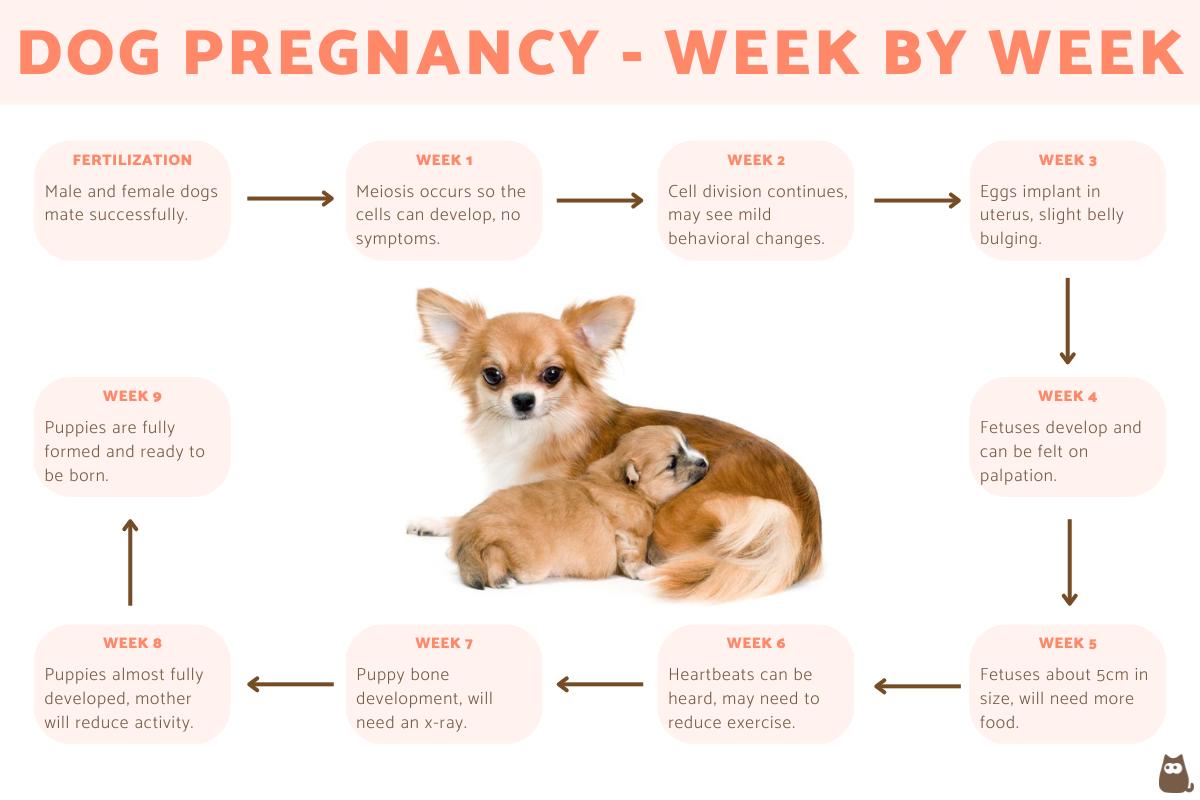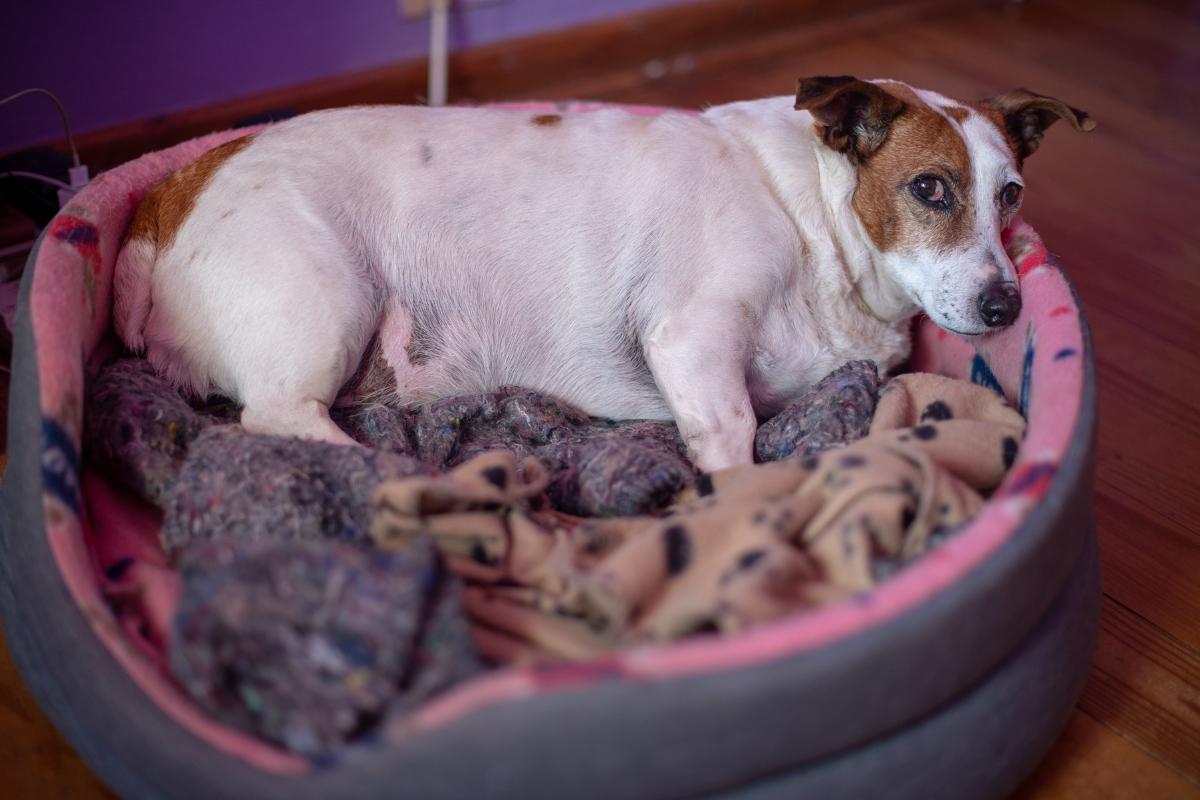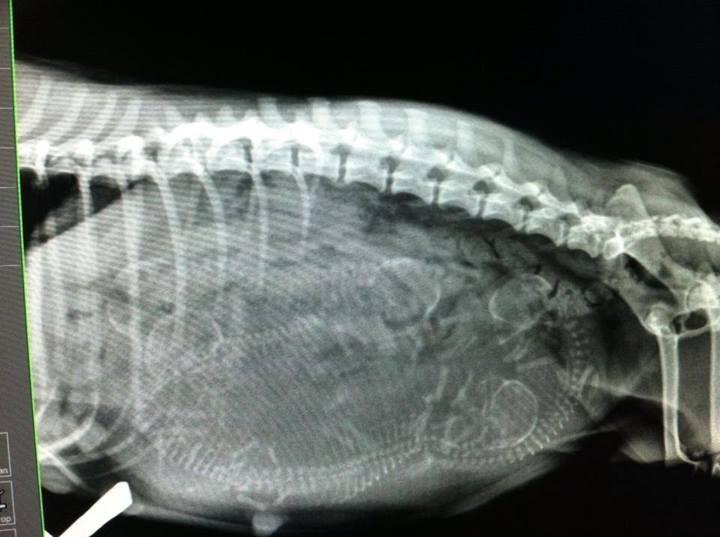Dog Pregnancy - Week by Week

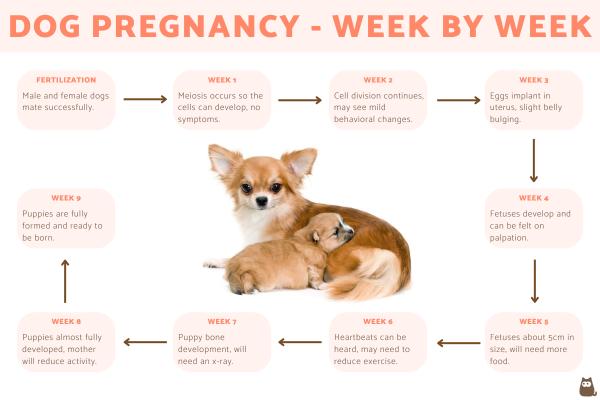

See files for Dogs
A healthy dog pregnancy will last around 63 days with different stages during this period. As a caregiver to the dog, we need to best ensure the mother dog's health and well-being. Doing so will give her gestating pups the best potential start in life. In this AnimalWised article we are going to tell you all you need to know about a dog's pregnancy and gestation period, as shown in the diagram below. It is important to know what your beloved pet needs at each stage of this experience.
Keep reading to discover the stages of dog pregnancy - week by week. We explain the signs and symptoms your dog will experience during each progressive week. This will help you know what to expect from your dog, although it is not a replacement for the necessary veterinary checkups you should be carrying out. We also provide useful advice about the diet to follow at each week, as well as other aspects of care that will guarantee your dog the best possible health and well-being during their gestation.
First signs of dog pregnancy
Before we look at the week by week symptoms of dog pregnancy, you need to look for generalized signs that indicate your dog is pregnant. You may have your doubts, because mating is not always successful. If you are unsure about whether of not your dog is pregnant, here are some of the first signs a dog is pregnant you can look out for:
- Changes in vaginal flow: the first thing you should know if you suspect they may be pregnant is that dog's estrus cycle is not a reliable indicator. It is a common mistake to think that a dog's cycle resembles a human woman's, but this is not the case. A dog will have estrus only twice a year on average, so its absence is not a clear indication of pregnancy. Changes in vaginal discharge can be an early symptom of dog pregnancy. These may be changes in color and consistency, although there should not be any blood.
- Behavioral changes: there are also several behavioral signs that suggest your dog might be pregnant. Decreased appetite or changes in food preferences are common. She may have less energy, appearing tired and lying down for longer stretches of time. She may also show general discomfort, restlessness or a less obedience.
- Physical changes: dogs are pregnant for between 63 to 67 days, which is more or less 9 weeks. Around week 4, you will start to notice that dog's belly swells and begins to lower. A key symptom of a pregnant dog are the changes that occur in her breasts. You will notice that the dog's breasts grow bigger and her nipples become more prominent. This is a that the dog's body is already preparing for breastfeeding. You may even notice a little milk production.
If you detect any of these symptoms in your dog or have other reasons to believe she is pregnant, take her to the vet as soon as possible. The vet will be able to confirm the pregnancy using blood tests and ultrasounds. They will also give you advice and ensure that everything goes smoothly.
For more information on dog pregnancy symptoms, here is an article on signs of pregnancy in dogs.
False pregnancy in dogs
Sometimes, if a female dog is made to mate several times but fails to get pregnant, she may suffer a false pregnancy. This is may also be known as a phantom pregnancy in dogs. It is a condition in female dogs can also happen for no reason at all.
When the dog has a psychological pregnancy, their physical development and symptoms follow that of a normal pregnancy. You will notice similar signs such as swollen breasts which can confuse you into thinking your dog is actually pregnant. In these cases, the dog may also experience behavioral changes. After a few weeks she may even steal stuffed animals to treat them like puppies. You must be patient and empathetic with her because this stage usually lasts about three weeks at most.
The best way to tell if your dog is suffering a false pregnancy is to go to the vet when you suspect it. False pregnancy symptoms usually recede on their own, but they can sometimes worsen if not treated properly. For example, your dog can develop an infection in the breasts such as canine mastitis, caused by milk production. The vet will be able to review the health of your dog and suggest treatment if required.

Diagnosis of pregnancy in dogs
To check the whether your dog is pregnant you cannot use a human pregnancy test, because they are designed to detect a hormone that is only present in humans. You will have to visit the veterinarian, who will perform the following tests to diagnose pregnancy in the dog:
- Abdominal palpation: a certain level of skill is required to detect gestation simply by feeling its belly. Palpation can be used to detect dog pregnancy 23 to 30 days - three to four weeks - after mating. It is the most economical and traditional method, but is not 100% reliable and cannot reveal any problems that could occur.
- Serological tests: a urine analysis can confirm the pregnancy, but without providing data on the number of puppies or viability of the process. A serological test will give reliable results by around week 3 of the dog's pregnancy.
- Ultrasound: this is the most common, reliable and safe method for diagnosing pregnancy in dogs. It can be carried out approximately 25 days - four weeks - after mating. An ultrasound will confirm the dog's pregnancy but may not correctly detect the size of the litter.
- Radiography: this can only be done from day 44 (week 6 or W7) of gestation because of the low visibility that the puppies offer prior to that as well as their sensitivity to radiation damage. The ideal time to do carry out a radiography is during the last third of dog's pregnancy, when the risk for the puppies is minimal. It is the method most used to correctly estimate the number of puppies in the litter and any possible abnormalities.
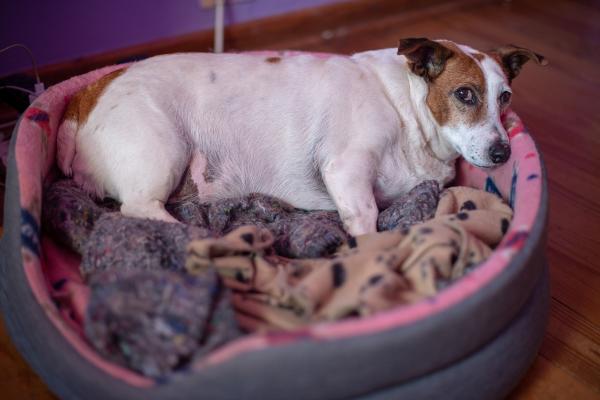
Dog pregnancy explained week by week
As we have mentioned before, it is important to make regular visits to the vet. They will monitor your dog's pregnancy and chart its weekly development. If you are interested in learning about the stages your dog will go through, here is a summary of the stages and symptoms of dog pregnancy week by week:
- Fertilization: pregnancy begins with successful fertilization. Once you know the female is ovulating, she can be mated. You may decide to repeat the mating a few days later to ensure the dog's pregnancy. Once fertilized, the dog's heat cycle ends and pregnancy begins.
- Week 1 (days 0-7): once the eggs have been fertilized, they begin to divide in a process called ‘meiosis’. During the first week of of your dog's pregnancy you are unlikely to observe any obvious symptoms of pregnancy as gestation has only just begun in the dog's uterus.
- Week 2 (days 8-14): at this stage the female sex cells continue to divide and, as in the previous week, you will not observe any physical changes. The only possible symptom of the dog's pregnancy may be slight behavioral changes. Depending on the individual dog, these may not manifest.
- Week 3 (days 15-21): in the third week the fertilized eggs are implanted in the dog's uterine lining. The main sign of this is a slight bulging of her belly, between 0.8 to 1 cm. These ‘lumps’ will become puppies. This is moment, as the first metabolic changes appear. You can go to the vet for a blood test and serological test to confirm the dog is pregnant at this stage of the dog pregnancy.
- Week 4 (days 22-28): during the fourth week the fetuses begin to slowly develop and will measure between 2-3 cm. By week 4, the puppies can be felt by palpation. You may also begin to observe some of the more tell-tale signs of pregnancy in your dog, such as changes in vaginal discharge or swelling in her breasts. Around day 25, you can take your dog to the vet for her first ultrasound.
- Week 5 (days 29-35): by the fifth week the fetuses will have increased in size, reaching about 5 cm. They will also begin to develop much faster. Therefore, this the time to start paying extra attention to your pregnant dog, especially regarding diet. You will notice she seems hungrier. To meet her higher energy needs, you can increase her ration by about 5% each week from now on. We recommend you consult the veterinarian for specific advice relating to your dog's needs.
- Week 6 (days 36-42): by week 6, the heart beats of the puppies can be detected via auscultation. The fetuses already exceed 6-7 cm. As a result, you will notice that the dog's abdomen becoming significantly larger. This is a good time to prepare the a special whelping box or bed for and to continue paying attention to her care, including food and exercise.
- Week 7 (days 43-49): the seventh week is when the puppies' bones are mineralizing. This is a good time to schedule an x-ray with your vet, to figure out the exact number of puppies. This is important so that at the time of delivery you can confirm that no puppy is left inside. The radiography will also help detect any possible problems or complications in the pregnancy. Around this stage of the dog pregnancy, she may seem to lose her appetite. Encourage her to continue eating with soft or appetizing food. Another symptom you may notice around is further swelling of the dog's breasts and seepage of some milk.
- Week 8 (days 50-57): by day 50 the skeleton of the fetuses is completely formed. You may notice that the pregnant dog spends more time in the whelping box or bed. Make sure you place it in a location where she feels safe and comfortable. The room should should not be too cold or dry. Remember to keep food and water within her reach. The puppies already have sensitivity to the touch, so to encourage their development, you can caress the dog's belly. If you notice milk flowing more freely from her breasts, do not worry. This is a normal symptom at this stage in the pregnancy. We recommend bathing the dog at the end of this eighth week so the delivery is as hygienic as possible. If you think a bath may cause your pregnant dog stress, you can try cleaning her without a bath instead.
- Week 9 (days 58-65): the puppies are fully formed now and ready to be born. Be attentive 24 hours a day, taking turns with your relatives if needed, as your dog may need your help. Remember to keep you vet on speed dial during this week. Symptoms you may notice the final week of pregnancy are nesting behavior, increased restlessness or discomfort. In a later section we will discuss how to recognize the symptoms of a dog's labor and how to deal with your dog's delivery.
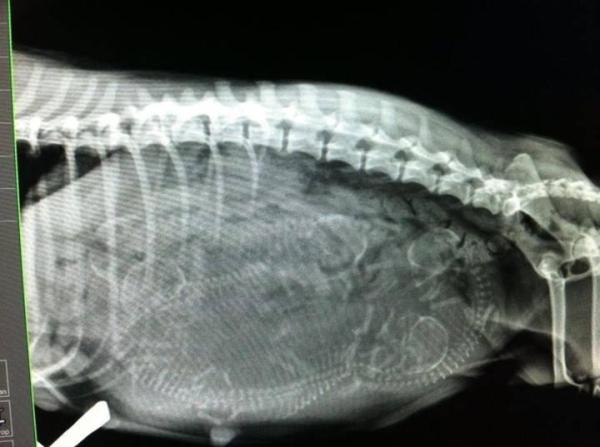
Feeding a pregnant dog - week by week
Providing your dog with a a balanced, healthy and nutrient-rich diet during her pregnancy is crucial to her health and that of the developing puppies. It is also important to adapt her diet to her specific needs at each stage of pregnancy. Below are some tips to make sure that your pregnant pup enjoys the best care and attention, remember to take her to the vet throughout the process to avoid complications:
Weeks 1-2: during the first weeks pregnancy is difficult to detect. Your dog will probably continue to eat food as usual. In fact, you should not change her diet during the first two weeks, even if you know she's pregnant. She will also continue to enjoy walks and games every day.
- Week 3: by the third week, symptoms of pregnancy will be easier to detect. You may even notice your dog is feeling uneasy or appears nauseous. If your pregnant dog is suffering from nausea, try giving her food little by little and give her smaller portions spaced out instead of big meals all at once.
- Week 5: as we explained in the previous section, the fifth week is when a pregnant dog's energy requirements will increase. Consequently, we should increase her daily food portion. The recommend amount is a 5% increase each week from the fifth week onwards. Remember that you are not only feeding her, but also the puppies she carries. Consult your vet to figure out the exact quantity which can vary depending on the number of puppies and other factors.
- Week 6-7: your dog's diet should already be balanced and nutritious, but you may have heard that dogs require nutritional supplements during pregnancy. Any protein or vitamin supplements should be introduced only from week 6. Feeding these to your pregnant dog prior to this could lead to improper development of the fetuses. By six weeks, the dog needs nutrients that favor the healthy development of her pups. Always consult your vet before deciding what supplements to give your pregnant dog or whether they are needed.
- Week 9: in the final phase of pregnancy, the dog has increasingly less space in her body to keep food. We recommend that you administer the food frequently, but in smaller portions. Even if her bowl has a small amount, you must replenish it once it runs out. You may notice that she stops eating. This could be a sign that the dog is nearing labor. However, if you are worried about your pregnant dog refusing food, consult the vet.
Other tips for feeding a pregnant dog:
- If you notice abnormal changes in the pregnant dog's stool you can switch to canned or softer foods for easier digestion. You can even try homemade dog food.
- Although you need to feed your pregnant dog more, keep an eye on its weight to prevent obesity.
- Hydration is vital. Your pregnant dog should always have a large bowl of fresh water at their disposal.
- After the puppies are born, the dog will need to continue on a special diet to favor the production of milk.
- Never administer medications to a pregnant dog unless instructed to by the veterinarian.
- Always consult the vet if you notice strange or worrying behavior in your pregnant dog.
General care for a pregnant dog
During this very special process of pregnancy, your dog is more sensitive. For this reason, you should be more aware of her needs. As we have mentioned, you must take the pregnant dog to the vet regularly to perform the relevant tests and verify that the pregnancy is progressing correctly.
The most important part of caring for a pregnant dog is proper diet and nutrition, detailed in the previous section. We also recommend that she has a comfortable bed in a separate room if necessary and that it is away from cold, drafts or stressful noise. It is a good idea to provide her with a whelping box with blankets and other appropriate soft materials which she will use to create her nest to give birth.
Some guardians want to can a pregnant dog exercise, such as going for walks or playing games. Pregnant dogs can and should exercise, but always taking certain precautions when doing so. During the first weeks of pregnancy you should maintain the dog's normal exercise routine where she is free to play and run as she sees fit.
Around week 5 or 6 you should begin to reduce the amount of physical exercise, choosing calmer, indoor activities. You can continue taking your pregnant dog on walks, as it is good for her to get outside. It is also important that you never force her to exercise. If she seems reluctant to move, consult your vet for advice on how to make sure your pregnant dog gets adequate exercise.
Finally, caring for your dog's emotions during her pregnancy is essential. Spend time with her and pet her when she allows. The idea is to create a positive environment which will ensure your dog has a smooth pregnancy and the puppies develop normally. Always be patient with your pregnant dog, guaranteeing her tranquility and comfort.

Dog labor and delivery
If your vet has not told you there is a risk, your dog will give birth at home. Otherwise, when symptoms of labor appear, you should go to the veterinary clinic immediately.
If your dog is going to deliver at home, remember that it is a difficult time for her. Although a dog will usually manage delivery on her own, it is possible that she will need your assistance. Take turns watching with someone else so you can be by her side at all times. Most importantly, keep your vet's emergency number handy in case any complications arise.
As you now know, a dog's pregnancy ends in week 9 with delivery usually taking place between days 60-63. However, your dog could go into labor a few days earlier or later, so keep an eye out for signs that your dog is going to give birth such as:
- Dilation of the vulva and pelvic ligaments
- Appetite loss
- Drop in body temperature
- Your dog seems irritated or nervous (this is normal, don't worry)
- She is nesting by preparing her delivery space
My dog is about to give birth
The puppies themselves are the ones who trigger the birth. There are three phases of childbirth or ‘whelping’ as it is called in dogs:
- Relaxation or dilation of the uterus: this first phase can last between 4 to 24 hours. The female is preparing to expel the puppies, and she may show symptoms of restlessness or nervousness. The vulva is enlarged and you may notice some fluid discharge.
- Expulsion of the offspring: in the second stage the puppies are delivered. Your dog will have contractions that become intense, lasting at least 60 seconds. You will notice that she starts licking her genital area. The contractions will become stronger until the first puppy is delivered (attached by the umbilical cord to the placenta). The rest of the puppies will follow at intervals of about 30 minutes to an hour. Generally delivery usually lasts around 2 hours but it can be lengthened considerably if your dog has a very large litter (there are cases up to 24 hours). The female will lick each puppy to stimulate them, break the layer of placenta and sever the umbilical cord. There are very few cases in which she does not. If you notice that your dog does not have the strength to carry out this task, you will have to cut the chord yourself. Remember that you must count the puppies to know that they are all out.
- Placenta expulsion: this stage happens more or less simultaneously with the second. During the delivery, each puppy is born wrapped in placenta, which the dog breaks to let the puppy breathe. She may also eat the placenta, because its nutritional value is very high. If you notice that she does not break the placenta, do it yourself, as the puppies could die if it they are not released soon. In addition, if the placenta expelled is too large it is better not to let your dog eat it all, as it can lead to digestive problems.
If more than two hours pass between the delivery of each puppy, or your dog has been in labor for over 24 hours and still has puppies inside her you must contact the vet immediately.
Possible problems during delivery
In most cases there are no risks during the birth of puppies. Even so periodic veterinary visits during your dog's pregnancy are important. A professional will be able to tell if your pregnant dog can give birth at home without any problems or will require specialized care.
If you notice any of the dog labor complications below, call the emergency vet without delay:
- Absence of uterine contractions
- Uterine contractions without birth
- Hemorrhage
- Abortion
- Abnormal birth (fetus jam)
- Retention of the placenta (not expelled)
- Fetal death
- Mummification
Here are some tome tips for the three most common complications in a dog's labor:
- Puppy stuck: if you see a small puppy stuck in the birth canal you should never pull at them. Instead, rotate them clockwise to encourage the opening of the vagina to release the pup.
- The mother fails to cut the umbilical cord: use a sterilized pair of scissors to cut the cord.
- A puppy does not breathe: in this case, open their mouth and practice artificial respiration. In addition, massage the region of the thorax to stimulate blood flow but without harming them. You can also them a little while you hold their head carefully.
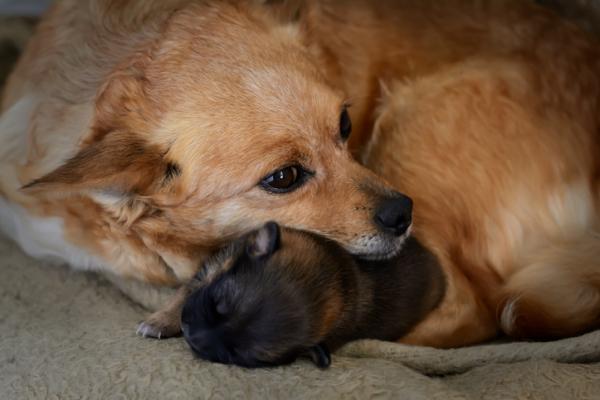
Caring for the newborn puppies
Puppies depend entirely on their mother for everything from food to regulating their body temperature. The female's breast milk is very important because it immunizes them against various diseases that may exist in their environment. The first breast milk she will produce is known as colostrum which is full of the good stuff puppies need to start their lives on the right paw.
As we have mentioned before, if you observe that your dog does not clean or feed the puppies, or if she abandons them altogether, you will have to perform these tasks yourself. For more information, check out our article on diet for a prematurely weaned puppy.
If the mother leaves them alone for long, wrap the pups in cotton towels and place them all in the same small and warm environment to maintain body heat. If she does not offer to breastfeed them, provide the milk formulated for newborn puppies. Always feed in small doses and be very careful not to overfeed.
The female dog will not reject her puppies if you pick them up, but consult our guide on handling newborn puppies for more advice. It is also important to talk to your vet and ask for their advice during the various week-by-week stages of dog pregnancy.
If you want to read similar articles to Dog Pregnancy - Week by Week, we recommend you visit our Gestation category.






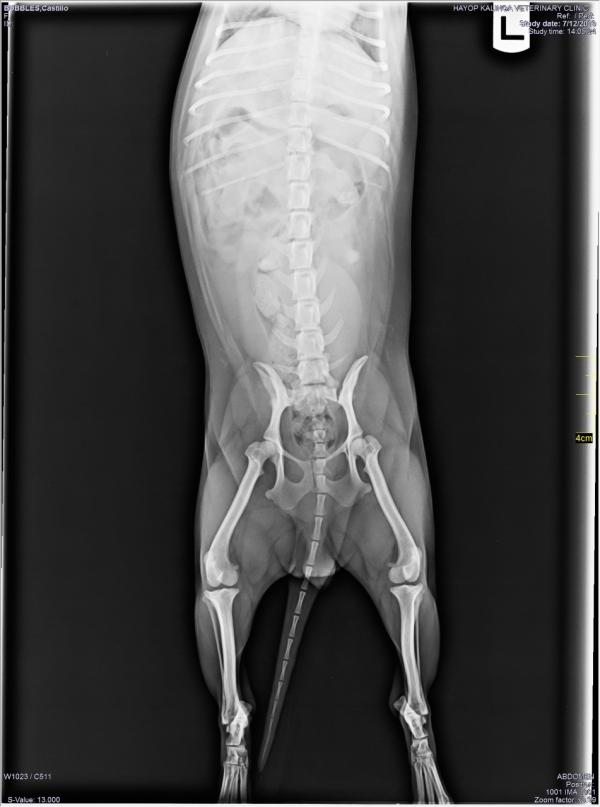 my baby is almost 4yrs old, 1st time to have litter. she showed everything that you mentioned about signs of being pregnant. her supposed to be due date is tomorrow. she undergo x-ray today and going back to the vet tomorrow. but looking at the x-ray i dont see and vertebrae. the vet said 2weeks ago it might be only 1 puppy, her belly isnt that big. she's a shih tzu. i'm getting worried about her condition. she got humped 3x but didnt locked.
my baby is almost 4yrs old, 1st time to have litter. she showed everything that you mentioned about signs of being pregnant. her supposed to be due date is tomorrow. she undergo x-ray today and going back to the vet tomorrow. but looking at the x-ray i dont see and vertebrae. the vet said 2weeks ago it might be only 1 puppy, her belly isnt that big. she's a shih tzu. i'm getting worried about her condition. she got humped 3x but didnt locked.

